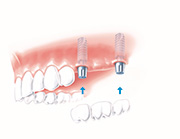Dental implant

Purpose
To treat single teeth and larger gaps, dental implants can be inserted into the jaw today. Shortened dental rows can also be supplemented or the support of poorly fitting dentures can be successfully improved.



Process
The implant is a titanium screw which is inserted into the jawbone during a surgical procedure. This serves as an artificial tooth root. After successful healing, ceramic crowns, bridges or concealed anchoring elements for prostheses can be screwed onto this artificial root.

Advantages of dental implants
A major advantage of an implant is that the adjacent teeth do not have to be “injured” to accommodate a bridge. Thus, these teeth have a better long-term prognosis.
Limits
The use of implants must be carefully clarified and planned beforehand. The remaining teeth of the dentition and the dental bed must be healthy or must have been successfully pre-treated. The use of dental implants may be restricted by general medical circumstances, poor periodontal condition (inflammation of the dental bed), smoking and other risk factors. In very complex cases we cooperate with the respective experienced specialists.
Dental implant costs
The expected costs for an implant restoration can vary greatly. Factors that have a decisive influence on costs:
- Necessity of artificial bone augmentation
- Type of healing (below or through the gums)
- Type of reconstruction (crown / bridge / prosthesis)

 EN
EN 
